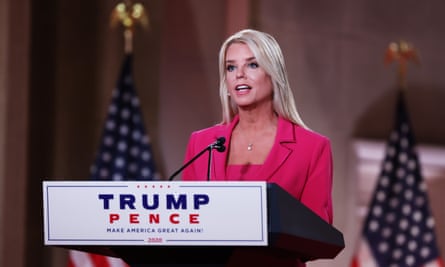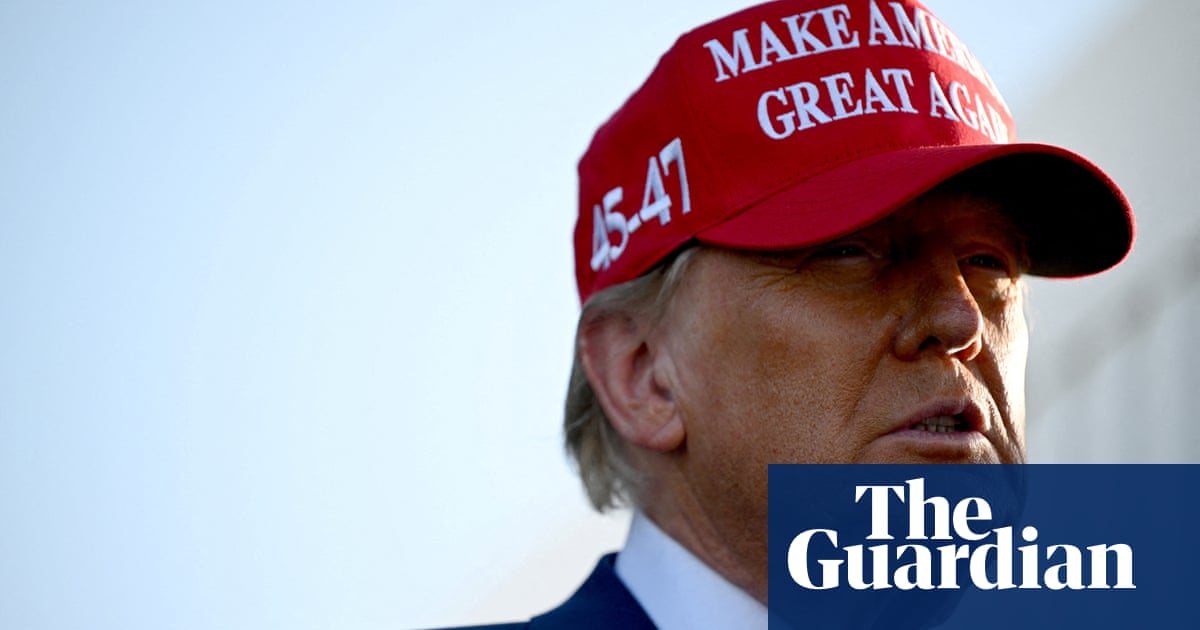Donald Trump could use a second term atop the justice department to gut enforcement of US federal voting laws and deploy an agency that is supposed to protect the right to vote to undermine it, experts have warned.
Trump has made no secret of his intention to punish his political enemies and subvert the American voting system. His control of the justice department could allow him to amplify misleading claims of voter fraud by non-citizens and others, as well as investigate local election officials.
It could also cause the department’s voting section to largely scale back its enforcement of the Voting Rights Act, returning it to the approach that it took under Trump’s first term.
Trump’s pick to lead the department could give an indication of its future direction. Pam Bondi, the former Florida attorney general, assisted Trump’s efforts to try to overturn the 2020 election results, echoing false claims of fraud. Trump has also picked Harmeet Dhilon, a staunch loyalist who supported his effort to overturn the 2020 election, to lead the civil rights division at the department. Her law firm has also been involved in several cases arguing in favor of voting restrictions.
Trump plans to use the department to hunt for evidence of fraud in the 2020 election, the Washington Post reported earlier this month. Numerous audits and investigations have shown he lost in 2020.
Trump himself has suggested he will not do this. “I have the right to do that but I’m not interested in that,” he said during a December interview on NBC’s Meet the Press.
Much of the discussion about Trump’s justice department has focused on the fate of its voting section, which is charged with enforcing the nation’s federal voting rights laws. Cleta Mitchell, a Trump ally who sought to overturn the 2020 election and has become a key figure in the election denial movement, has called for all of the lawyers in the voting section to be fired.
“They are all leftist activists and use taxpayer dollars and the power of the federal government to advance their leftwing legal theories,” she said in an email. “Their loyalty is not to the constitution and the rule of law. They should go back to the leftist advocacy groups they came from.”
Career attorneys in the justice department have apolitical jobs in which they are charged with representing the position of the United States, regardless of the administration. Attorney general Merrick Garland has reportedly urged department employees to stay on, and decried attacks against those employees.
But simply undertaking a mass firing of career employees in the voting section would not be easy, and would require masterly management of a sprawling bureaucracy, said Sam Oliker-Friedland, a former voting section attorney who now leads the Institute for Responsive Government, a non-profit focused on election administration.
“Good luck with that,” he said. “It takes a lot to manage bureaucracy into doing what you want; administrations at both parties have figured that out over the years.”
Instead of a mass reorganization of the voting section, Oliker-Friedland said, a more plausible scenario is blocking the section’s attorneys from bringing any real voting rights enforcement cases.
Shortly after Trump was inaugurated in 2017, the section withdrew its support in two major voting rights cases challenging Texas’s voter ID law and Ohio’s practice for purging voters from the rolls. It filed almost no new voting rights enforcement cases during the four years Trump was in office.

The Biden administration brought the justice department back into the enforcement arena. It opposed new restrictions in Georgia and Texas, challenged aggressive voter purging in Virginia and Alabama, and supported plaintiffs challenging restrictions on collecting mail-in ballots.
“An early test will just be how aggressive they are in whether or not they’re changing positions,” said Danielle Lang, who leads voting rights litigation at the Campaign Legal Center, a watchdog group.
Marc Elias, a prominent Democratic voting rights litigator, has called on the Biden justice department to either dismiss or withdraw from voting cases it was involved in before the change in administration.
“The Biden administration should not hand over cases in which Dhillon can have [the] DoJ switch sides and undermine voting rights. We are on our own from here,” he wrote in a post on Bluesky.
In the longer term, Project 2025, the 900-page document that offers a radical rightwing roadmap for the Trump administration, offers a more alarming vision for how Trump could reshape the work of the justice department.
The section focused on the department, written by former Trump administration official Gene Hamilton, says federal prosecutors should use a federal statute passed after the civil war to protect voting rights as a means instead of prosecuting local election officials. The department should deploy provisions of law passed to protect voters from intimidation as part of the Ku Klux Klan Act in the 19th century to criminally charge local officials who interpret their state’s election laws in a way that conflicts with state law, Hamilton wrote.
As an example of the kind of prosecution the department could bring, the document points to guidance that Pennsylvania’s top election official issued in 2020 to allow voters to cast a provisional ballot if their mail-in ballot was rejected. That decision wrongly interpreted state law, according to Project 2025, and the justice department should prosecute the Democratic official who served as Pennsylvania’s top election official.
Still, any such attempts might face hurdles in getting implemented.
“There is literally no federal prosecutor I know of – and I know of a lot of federal prosecutors who disagree with me on things – who would presently file a federal criminal indictment for violation of the Ku Klux Klan Act against a state official with a disagreement with other state officials on how state law should be interpreted,” said Justin Levitt, a law professor at Loyola Law School in Los Angeles who served as a top official in the civil rights division under Barack Obama.
Levitt said the example in Project 2025 was particularly alarming and signaled that the department under Trump would not hesitate to undertake political prosecutions.
after newsletter promotion
“It isn’t a wild pitch,” he said. “That’s throwing a fastball directly in the face of a random fan to demonstrate that you can do it to any fan in the stadium.”
Criminal investigations of local election officials would be concerning, even if they do not ultimately result in criminal charges, some experts argue.
“By no means is it appropriate for the justice department – a federal law enforcement agency – to determine whether any state official has properly exercised their authority of state law,” Sean Morales-Doyle and Lauren Miller Karalunas wrote in an analysis for the Brennan Center for Justice earlier this year.
Trump and his attorney general could also use the justice department to launch investigations to help build the narrative that voter fraud is a problem in the US.
This has occurred before. In 2020, when officials were investigating why a temporary elections employee in Luzerne county, Pennsylvania, accidentally discarded nine ballots, the then attorney general, William Barr, rushed to brief Trump on the matter and Trump quickly made the matter public.
The federal prosecutor overseeing the case then made a public statement confirming an investigation into the matter, breaking with longstanding justice department policy not to comment on current investigations before charges are filed.
Under a Trump administration, the department could launch inquiries and even prosecutions of non-citizens who vote because they are confused about their eligibility. Republicans recently sought to pass a bill to require proof of citizenship to vote and eagerly spread the lie that non-citizens are voting in US elections.
“You can just prosecute an individual for making a mistake – and you might see some of that,” Oliker-Friedland said. But he added that, in his view, a prosecution over a mistake “sounds like a pretty big waste of everyone’s time”.
Beyond prosecutions of individuals, voting rights laws themselves could face attacks from the administration.
One possible target is the 1993 National Voter Registration Act, which, among other things, prohibits states from systematically removing voters within 90 days of a federal election. Before the 2024 election, two states, Alabama and Virginia, continued to systematically remove voters within that window and were sued by the justice department.
Trump is also inheriting the justice department at a critical moment for the Voting Rights Act, the landmark 1965 civil rights law that has been gutted by the supreme court in recent years.
Republicans have been chipping away at section 2 of the law, which prohibits voting practices that discriminate on the basis of race. And in a lawsuit moving through the federal courts, Republicans are making the novel argument that only the federal government, not private plaintiffs, can enforce section 2.
The vast majority of section 2 cases, however, are filed by private plaintiffs, including non-profits such as the American Civil Liberties Union and the NAACP Legal Defense and Education Fund. So far, the justice department has made legal filings in the suits opposing the idea that it is the sole enforcer of section 2, but a Trump justice department could reverse that position.
Lang and other voting rights litigators are closely watching that case.
If courts were to ultimately rule that only the attorney general could bring cases, it would effectively end litigation under section 2. Even in an administration committed to enforcing the Voting Rights Act, private plaintiffs are often able to respond more quickly to voting rights violations.
While Lang said she was not convinced courts were going to embrace the idea that there is no private right of action, “if that position were to somehow prevail” it would make a huge difference, she said.
“It would be the death knell for Voting Rights Act litigation altogether,” Lang said.

 German (DE)
German (DE)  English (US)
English (US)  Spanish (ES)
Spanish (ES)  French (FR)
French (FR)  Hindi (IN)
Hindi (IN)  Italian (IT)
Italian (IT)  Russian (RU)
Russian (RU)  1 day ago
1 day ago
























Comments